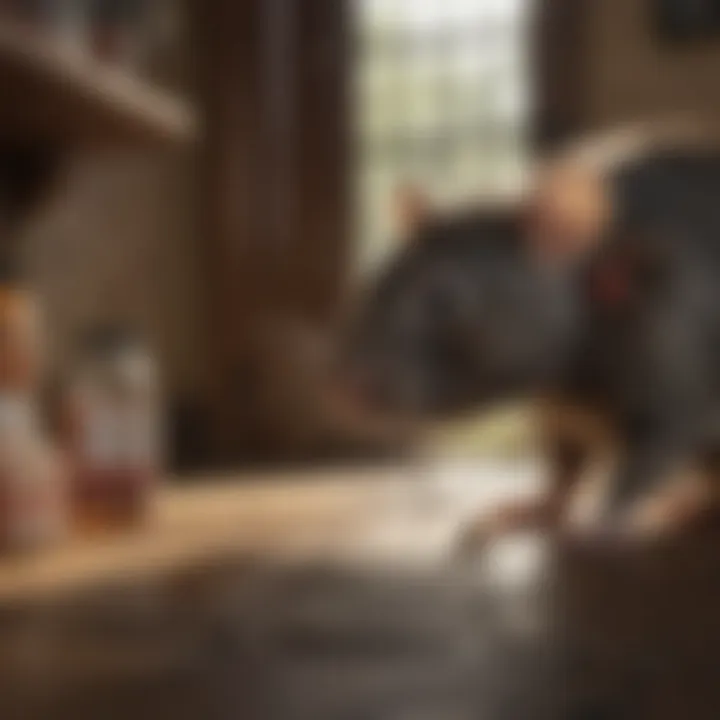Peppermint Oil as a Natural Rat Repellent: Efficacy Review


Intro
The presence of pests in our living spaces can lead to significant distress. Among these, rats are notorious for their ability to wreak havoc in homes. Thus, finding effective solutions to prevent and control their infestations is crucial. In this analysis, we will evaluate peppermint oil as a possible natural deterent against rats.
In urban and rural settings alike, the struggle against rat populations is increasingly common. Homeowners and pest management enthusiasts are turning to alternative methods that are more environmentally friendly. Peppermint oil is one such method. However, there is a need to scrutinize its efficacy thoroughly.
This article seeks to shed light on the potential of peppermint oil. It will explore its chemical properties, historical usage in pest control, and review both scientific studies and anecdotal evidence regarding its effectiveness. Furthermore, we will focus on its practical applications alongside its limitations. By the end of this piece, readers should have a clearer understanding of peppermint oil’s role in broader pest control strategies.
Understanding Pests
Definition of Pests
Pests are organisms that impact human activities negatively. This includes insects, rodents, and other wildlife that invade living spaces, typically in search of food, shelter, or nesting sites. Rats fall under this umbrella, known for their ability to cause damage to both properties and health.
Importance of Pest Identification
Identifying pests accurately is essential for effective management. Knowing what kind of pest one is dealing with can determine the success of control measures employed. For instance, understanding rat behavior helps in crafting preventive strategies that are more tailored and effective.
Prevention Techniques
Home and Garden Preventative Measures
Preventing an infestation is much easier than eliminating it once it occurs. Here are some practical measures:
- Seal Entry Points: Check for holes and gaps in walls, floors, and baseboards. Use materials like steel wool to seal these openings.
- Maintain Cleanliness: Ensure food waste and crumbs are cleaned promptly. Rats are often attracted to easy food sources.
- Trim Vegetation: Maintain your garden by trimming back overgrown plants and trees, which could provide cover for rats.
Seasonal Prevention Tips
Each season brings its own challenges for pest control. In colder months, rodents may seek warmth indoors. In contrast, summer may make outdoor areas more appealing. Taking proactive steps year-round can effectively deter rats.
- Fall: Inspect outdoor areas and seal potential entryways before temperatures drop.
- Spring: Clear out clutter from both indoor and outdoor spaces to reduce nesting sites.
Eco-Friendly Pest Control Solutions
Overview of Sustainable Practices
Modern pest control increasingly favors eco-friendly methods. These practices not only benefit the environment but also promote safer habitats for home inhabitants. Homeowners are encouraged to consider sustainable solutions before resorting to chemical treatments.
Natural Remedies and Their Effectiveness
In addition to peppermint oil, there are various natural remedies available:
- Essential Oils: Oils like eucalyptus and citronella can also fend off pests. The effectiveness can vary based on formulation and concentration.
- Physical Barriers: Installing traps or using natural repellents can supplement oil treatments. The combination can enhance results.
"Natural pest control methods provide long-term benefits for the environment while safeguarding your home."
Peppermint oil's specific efficacy will be explored in subsequent sections, detailing its chemical nature and supported by research findings. Readers are invited to consider how integrating such practices can play a role in broader pest management strategies.
Preface to Pest Management Solutions
Effective pest management is crucial for maintaining both the hygiene and safety of our homes. In recent years, many homeowners have turned to natural solutions, such as peppermint oil, to combat pests, particularly rodents. Such approaches are becoming popular, partly due to growing concerns about the safety and environmental aspects of traditional chemical pesticides. This article aims to assess the efficacy of peppermint oil as a natural repellent against rats, delving into its natural properties and historical use.
Understanding the Challenge of Rat Infestations
Rat infestations present a genuine challenge for households. These creatures are not only a nuisance but also pose health risks through the transmission of diseases. Their ability to reproduce quickly adds to the difficulty, as an initial small group can rapidly escalate into a larger problem.
Homeowners often face several key issues when dealing with these infestations:
- Health Risks: Rats can carry pathogens that lead to serious diseases, such as leptospirosis and hantavirus.
- Damage to Property: The habit of gnawing through wires, insulation, and walls can lead to costly repairs.
- Contamination of Food Sources: Rats often invade kitchens and pantries, contaminating food and surfaces.


Given these challenges, it is essential to explore effective prevention methods. This article will investigate how peppermint oil might function as a natural deterrent, complemented by an analysis of its components, historical usage, and effectiveness compared to traditional methods. Understanding these aspects is key to developing a comprehensive pest management strategy that not only addresses current infestations but also prevents future ones.
Assessing Peppermint Oil
Assessing peppermint oil is a pivotal aspect of understanding its effectiveness as a natural deterrent against rats. Homeowners often seek alternatives to traditional chemical repellents that are perceived as toxic or harmful to their households and the environment. By exploring the specific characteristics of peppermint oil—ranging from its chemical makeup to historical applications in pest control—one can make informed decisions about employing it in household pest management.
Evaluating peppermint oil not only reveals its potential benefits and limitations but also encourages a more holistic approach to pest control. Homeowners may find that integrating peppermint oil into their strategies could result in better outcomes, both for immediate pest issues and for long-term management.
Chemical Composition of Peppermint Oil
The efficacy of peppermint oil in repelling rats is largely attributed to its unique chemical composition. Peppermint oil contains several key compounds, primarily menthol and menthone, which contribute to its potent scent. This strong aroma can be overwhelming for rats, potentially discouraging them from entering treated environments.
- Menthol: Known for its cooling sensation, menthol has a strong odor that can mask other scents. This can make areas treated with peppermint oil less appealing to rodents.
- Menthone: Another significant ingredient, menthone may also play a role in deterring the presence of rats.
The concentration of these compounds in peppermint oil can vary based on how the oil is extracted and processed. Higher concentrations generally enhance the oil's repellent properties. Hence, understanding the specific formulation of peppermint oil is crucial when considering its application as a rat repellent.
Historical Usage in Pest Control
Peppermint oil has a long-standing history as a natural remedy in pest control, which dates back centuries. Ancient civilizations recognized the benefits of various essential oils for keeping pests at bay, and peppermint was no exception. Historical use of peppermint oil often includes its applications in homes, gardens, and agriculture for its scent and insect-repelling properties.
- Traditional Practices: In many cultures, peppermint was employed in sachets or used to make homemade sprays. These methods were aimed at repelling pests without resorting to harmful chemicals.
- Cultural Acceptance: As environmental concerns grew, the push for natural pest control solutions led to renewed interest in peppermint oil. Its historical context helps understand why it has garnered attention in modern pest management discussions.
Understanding how peppermint oil was used in the past provides insight into its potential effectiveness today, particularly when looking for natural alternatives that align with contemporary values surrounding health and environmental safety.
Mechanisms of Action
Understanding the mechanisms of action related to peppermint oil is crucial because it underpins the potential effectiveness of using this oil as a rat repellent. This section will explore how peppermint oil interacts with rats chemically and neurologically, as well as how this natural approach compares to more traditional chemical repellents.
How Peppermint Oil Affects Rats
Peppermint oil contains several compounds that could impact rats. The primary active ingredient is menthol, which has a characteristic strong aroma. When rats encounter this scent, their natural behavior is disrupted. The intense smell can overwhelm their olfactory senses, making it difficult for them to navigate their environment or find food. Researchers suggest that the strong odor signifies a presence that is unpleasant, prompting avoidance rather than attraction.
Moreover, peppermint oil can act as an irritant. When applied to certain areas, it may create an environment that is physically uncomfortable for rats. This discomfort encourages them to seek refuge elsewhere.
It is noteworthy to mention that while peppermint oil may deter rats, it does not guarantee complete eradication in an infestation scenario.
Comparative Analysis with Chemical Repellents
When comparing peppermint oil with traditional chemical repellents, several factors come into play. Chemical repellents often provide a rapid response to infestations, usually achieving immediate results. They can effectively kill or repel pests but may come with health risks for humans and pets in close quarters. These substances typically contain synthetic compounds that can lead to toxicity and pose environmental concerns.
Peppermint oil, on the other hand, presents a more natural alternative. It provides a meta-safe profile, reducing the risk of harmful effects on household members. However, its efficacy may be less robust than some commercial chemical repellents. For renters and homeowners concerned about residue or toxicity, peppermint oil can serve as an attractive alternative.
In terms of usage, peppermint oil requires a more directed application, often needing repeat applications to maintain its effectiveness. Moreover, it may not penetrate infested areas as deeply, which can limit its reach against well-established infestations. On the other hand, its natural composition aligns with increasing consumer preferences for eco-friendly solutions in pest control.
In summary, peppermint oil involves a gentler method of repelling rats compared to harsher chemicals. However, it also demands a nuanced understanding of both its capabilities and limitations in practical scenarios.
Scientific Findings
Review of Relevant Studies
Several studies have investigated the use of peppermint oil as a natural repellent against rats. One notable study published in the Journal of Pest Management Science explored the repellency of peppermint oil in controlled settings. Results indicated that rats exhibited avoidance behavior when exposed to high concentrations of peppermint oil. The study concluded that peppermint oil could disrupt the olfactory senses of rats, thus leading them to steer clear of areas treated with this oil.
Another research from Pest Control Technology highlighted not just the repellent properties but also discussed how the chemical composition of peppermint interacts with rodent biology. It was established that the primary constituents of peppermint oil, menthol and menthone, contributed significantly to its repelling ability.
Furthermore, a survey conducted on homeowners using peppermint oil in their pest control regimen found a significant percentage reporting decreased rat activity in treated areas. This anecdotal evidence complements more systematic studies, providing a well-rounded perspective on the oil's practical effectiveness.
Limitations of Current Research
While the findings are promising, they do come with limitations. Many studies have been conducted in controlled environments that do not fully replicate the complexities of real-world situations. Variables such as food availability, shelter, and the presence of competing repellents can influence the outcomes, but these factors are often not accounted for in laboratory settings.


Additionally, the concentration of peppermint oil plays a vital role. High concentrations may be effective, but they may not be practical or safe for everyday use in home settings. The durability of the oil's effectiveness over time, especially when exposed to environmental elements, remains another area that requires further investigation.
Moreover, while studies may indicate a reduction in rat presence, they often do not quantify the reduction in long-term infestations. This makes it difficult for homeowners to gauge the true efficacy of peppermint oil over extended periods.
The need for more extensive field studies and longitudinal research is crucial to provide clearer insights. Understanding these limitations is important for homeowners to avoid over-reliance on peppermint oil as a sole solution for rat infestations.
Anecdotal Evidence and User Experiences
Anecdotal evidence plays a significant role in the ongoing discussion around the efficacy of peppermint oil as a pest deterrent. Homeowners often turn to shared experiences for practical insights that scientific studies may not fully capture. While these individual stories do not replace rigorous scientific data, they can illustrate real-world applications and outcomes that resonate with many. Understanding how others have succeeded—or failed—while using peppermint oil can inform both expectations and methods for those considering this natural solution.
Benefits of Anecdotal Evidence
- Practical Insights: Individuals may share specific methods they employed when using peppermint oil. For instance, one homeowner might describe blending peppermint oil with water in a spray bottle and applying it around entry points, revealing practical strategies that can easily be replicated.
- Localized Response: The effectiveness of peppermint oil can vary by region or specific infestation situations. Anecdotal reports can highlight these differences, offering guidance based on local climates or rat behaviors.
- Enhanced Understanding: Hearing about successes and challenges adds context to scientific conclusions. If multiple users report that peppermint oil worked well in conjunction with other natural repellents, such as vinegar, it encourages a holistic approach to pest management.
Considerations Regarding Anecdotal Evidence
- Bias: Personal experiences are often subjective. A homeowner may attribute a decrease in rat sightings solely to peppermint oil without considering other factors, such as a decrease in available food sources.
- Generalizations: What works in one household may not apply to another. Variability in environmental conditions, rat species, and infestation levels complicates any sweeping conclusions.
In light of these factors, effectively using anecdotal evidence requires careful interpretation. Homeowners should weigh individual stories against established research and their personal circumstances, resulting in a more personalized pest control strategy.
Case Studies and Testimonials
User experiences regarding peppermint oil offer a wealth of practical insight. For example, one user in California reported a significant decline in rat activity after spraying peppermint oil around the foundation of their home. This case emphasizes how localized actions can yield different outcomes.
Another homeowner shared a story of experimenting with peppermint oil-soaked cotton balls in areas where rats were frequently spotted. They reported that this method not only kept rats at bay but also resulted in a fresher smelling basement—achieving two objectives at once: pest control and improved home ambiance.
Overall, such testimonials often highlight the value of perseverance and experimentation. While anecdotal evidence cannot substitute for scientific validation, it serves to inspire homeowners in their quest to effictively manage rat populations within their living spaces.
Practical Application Methods
Practical application methods are crucial to effectively utilizing peppermint oil as a natural rodent repellent. Homeowners need to understand how and where to apply peppermint oil for the best results. This section will outline specific techniques, the benefits they offer, and essential considerations to keep in mind.
Using Peppermint Oil in the Home
Incorporating peppermint oil within the household can serve as a method to repel rats. The first step is to create a peppermint oil solution. Combining water and peppermint oil in a spray bottle is a popular choice. A typical ratio is about 10 to 15 drops of oil in a clean spray bottle filled with water. Other materials such as cotton balls soaked in peppermint oil can also be utilized. Place them in areas where rat activity is noticeable, like under sinks, in cabinets, and along entry points.
Regular reapplication is important. The scent of peppermint oil fades over time; therefore, homeowners should continuously refresh their applications to maintain effectiveness. Peppermint oil is best used in conjunction with good sanitation practices. This means keeping food stored properly and maintaining cleanliness, to discourage rats from entering in the first place.
Safe Handling and Usage Guidelines
When using peppermint oil, safety cannot be overlooked. Essential oils are highly concentrated substances and can be irritating to the skin. It’s wise to conduct a patch test before applying the oil directly to surfaces or skin. Always wear gloves when handling peppermint oil to avoid skin irritation.
Keep the oil out of reach of children and pets. Accidental ingestion can lead to adverse effects. Additionally, when mixing peppermint oil with water, it is advisable to do so in well-ventilated spaces. Strong scents may cause discomfort if inhaled excessively.
To maximize safety, store peppermint oil in a cool, dark place. Exposure to heat and sunlight can compromise the integrity of the oil. Always check the expiration date on the bottle.
"Proper application methods are essential to ensure that peppermint oil functions well as a natural repellent."
In summary, peppermint oil can be effective in pest control when applied correctly. Understanding how to use and handle the oil safely increases its effectiveness and reduces potential risks.
Alternative Natural Repellents
The use of natural repellents offers a compelling alternative to traditional chemical solutions for pest control. Looking beyond peppermint oil can provide valuable insights into other options that might also serve to deter rats and other pests effectively. Households often seek these alternatives due to health concerns, the desire for eco-friendly applications, or the wish to maintain a non-toxic environment for children and pets.
Natural repellents frequently combine various essential oils, plant extracts, and other organic materials. These remedies often have properties that can disrupt a pest's sensory perception, making the environment less favorable for them. By leveraging knowledge about these alternatives, homeowners can create an integrated pest management approach to minimize rat infestations in a sustainable manner.
When considering these natural solutions, it is crucial to understand that the efficacy can vary significantly depending on several factors. This includes the concentration of active ingredients, the method of application, and the environmental context of usage. Therefore, exploring other essential oils alongside peppermint oil is a vital step to broaden one's approach to rodent control.
Some key points to consider when analyzing alternative natural repellents are:


- Safety: Most natural oils are generally safe when used correctly, reducing the likelihood of toxic exposure.
- Sustainability: With a growing focus on environmental impacts, natural repellents promote a sustainable living ethos.
- Cost-effectiveness: Often, these natural solutions are more affordable and accessible than industrial pest control products.
Furthermore, diversifying pest control methods by including several natural oils may enhance the overall effectiveness of the strategy. Making an informed choice about usage and combining remedies responsibly can lead to better outcomes for pest management.
Exploring Other Essential Oils
Several essential oils have shown potential in repelling pests, including rats. Some popular ones are:
- Eucalyptus Oil: Known for its strong scent, eucalyptus oil may act as a deterrent to rats.
- Rosemary Oil: This oil has a unique aroma that can disrupt the sensory orientation of rats, making areas less appealing for habitation.
- Lavender Oil: The soothing scent of lavender can repel rats while also adding a pleasant fragrance to environments.
Integrating these oils with peppermint can create a synergistic effect, potentially amplifying their repellent properties. Homeowners might consider creating essential oil blends to enhance overall effectiveness. DIY mixing can be done carefully, taking note of the recommended dilutions to ensure safety and potency.
"Using a cocktail of natural essential oils can empower homeowners to take charge of their pest control efforts without reliance on harsh chemicals."
Ultimately, tapping into the power of various essential oils is an appealing avenue for those looking to repel rats naturally. This multifaceted approach not only caters to the immediate need of pest control but also aligns with broader sustainability goals, making it attractive for conscientious homeowners.
Integrating Peppermint Oil into Pest Control Plans
Integrating peppermint oil into pest control plans is an essential consideration for homeowners seeking natural solutions to combat rat infestations. This approach not only aligns with sustainable practices but also utilizes a product that is widely available and easy to use. By incorporating peppermint oil into a broader pest management strategy, its effectiveness can potentially be maximized while reducing reliance on harsher chemicals.
Complementing with Traditional Approaches
While peppermint oil has been shown to have repellent properties against rats, it should not serve as a standalone solution. Its integration into traditional pest control methods enhances overall effectiveness. For example, strategic placement of peppermint oil in combination with traps can provide a comprehensive approach. Here are some ways to achieve this:
- Setting Traps: Use peppermint oil in conjunction with traditional traps to create a multi-faceted defense. The oil can deter rats from entering certain areas, while traps can catch any that may still approach.
- Sealing Entry Points: Incorporating peppermint oil into an overall strategy that includes sealing entry points is important. This could mean applying the oil around potential entryways, making it less inviting for rats to enter.
- Regular Maintenance: Maintaining cleanliness and removing potential food sources can work alongside peppermint oil. The oil may discourage rats if the surroundings are kept tidy and devoid of attractants.
Using both natural and traditional methods can assist homeowners in managing rat issues effectively.
Monitoring Effectiveness Over Time
After implementing peppermint oil within a pest control plan, monitoring its effectiveness over time becomes vital. This process allows homeowners to evaluate how well the oil is working in repelling rats and adjust their strategies accordingly. Here are some key considerations for monitoring:
- Observational Tracking: Keep a record of any signs of rat activity after applying peppermint oil. Look for droppings, nesting materials, or sightings of rats.
- Regular Reapplication: Peppermint oil tends to evaporate over time, which may diminish its effectiveness. Regular reapplication is necessary, so create a schedule for refreshing the oil in designated areas.
- Feedback and Adjustment: Collect feedback from family members or occupants about any observed difference in rodent activity. Adjustments may be needed if other pest control methods do not yield the desired results.
Continuous monitoring ensures that the strategy remains effective, allowing for modifications that suit the homeowner’s specific environment.
Integrating peppermint oil into pest control plans, coupled with traditional practices, and a solid monitoring system, can enhance the chances of a successful rat deterrence strategy, promoting a pest-free home environment.
Considerations for Homeowners
In evaluating peppermint oil as a potential rat repellent, homeowners must consider certain critical aspects. The implementation of any pest control strategy requires not only awareness of the methods available but also an understanding of their effectiveness and applicability. Peppermint oil may provide a natural alternative to chemical deterrents, but it is essential to approach its use with a well-rounded perspective.
Understanding the Limitations of Home Remedies
Home remedies, such as peppermint oil, can often appear appealing due to their natural composition. However, it is crucial to recognize their limitations. For instance, peppermint oil may not work effectively in all situations. Factors such as the size of the infestation, the environment, and the individual rat's behavior play significant roles in determining the success of using peppermint oil. Moreover, homeowners should remember that while peppermint oil may repel some rats, it is not a guaranteed solution. Its efficacy will vary based on several external factors and conditions.
- Peppermint oil’s ability to mask scents which rats rely on can only be effective to a certain extent. A powerful infestation may override the repellent properties of the oil, making it less effective.
- Many home remedies lack robust scientific backing, which limits their credibility when compared to professional methods.
- The oil’s potency can diminish quickly and requires frequent application to maintain its intended effect.
While it can offer temporary relief, relying solely on peppermint oil as a long-term solution is not advisable.
When to Seek Professional Help
Homeowners may encounter situations in which they cannot manage a rat problem effectively. Recognizing when to seek professional assistance is vital. If efforts to use peppermint oil do not yield satisfactory results, the following circumstances may warrant a professional pest control intervention:
- Persistent Infestations: If rats continue to be present despite repeated applications of peppermint oil or other home remedies.
- Signs of Severe Damage: Noticeable damage in structures or wrappings suggests a larger infestation may require a comprehensive approach by professionals.
- Health Hazards: Rats pose health risks. Their droppings and urine can lead to contamination and illness. If a homeowner feels that their health may be compromised, timely professional action is necessary.
- Specific Regulations: Local laws regarding pest control may dictate actions that a homeowner must comply with, thereby necessitating professional assistance.
Epilogue
The conclusion of this article highlights the multifaceted role of peppermint oil in the context of rat repulsion. Through exploring various aspects, it becomes clear that peppermint oil can potentially serve as a natural alternative to traditional chemical repellents. Homeowners are increasingly seeking environmentally friendly solutions for pest control, making peppermint oil a topic of significant importance.
Summation of Peppermint Oil's Potential
The efficacy of peppermint oil as a deterrent against rats stems from its chemical composition and historical usage. Studies suggest that the oils’ strong scent may disrupt the sensory receptors in rats, leading to avoidance behavior. While scientific evidence alone may not fully endorse it as a guaranteed pest control method, the research supports its place as a supplementary strategy in pest management.
"The exploration of peppermint oil reveals both its promise and limitations in the realm of natural pest control products."
Implementing peppermint oil into integrated pest management strategies can be advantageous. Its ease of application aligns well with the preferences of homeowners who may wish to avoid harsh chemicals. However, it should not completely replace traditional methods, especially in severe infestations. A balanced approach, combining peppermint oil with other pest control techniques, may provide the most effective results.
In summary, peppermint oil holds potential as a natural repellent against rats. Homeowners should consider this option alongside other methods, weighing its benefits and limitations carefully. By understanding the efficacy and application of peppermint oil, individuals can enhance their pest control strategies while adhering to a more sustainable approach.



